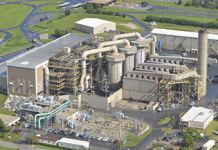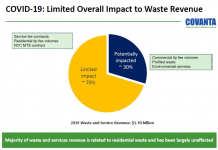Tom Konrad CFA
A truly sustainable economy would produce no waste: everything would be recycled or reused for some productive purpose. We’re a long way from that ideal today, but the rising cost of commodities makes recovering used material through recycling increasingly economic. Further, the rising cost of energy makes converting municipal and industrial waste into advanced biofuels or combusting it to produce electricity an increasingly economic option.
Attempting to guess which advanced biofuel technology will be successful strikes me as a fool’s errand. Why not instead invest in the owners of the feedstock? While I don’t know which technology will achieve commercial success, I do know that a technology which can turn trash into fuel will make the trash more valuable, benefiting the companies that haul the trash today.
Trash is already being turned into energy. Companies like Waste Management (NYSE: WM) have been installing turbines to convert captured methane gas from landfills into electricity for years. Companies like Covanta (NYSE:CVA), which operates more than 40 Energy-from-Waste facilities throughout the United States. The commodities boom have makes metals and electronics recyclers like Sims Metal Management (NYSE:SMS) more profitable as raw materials become more expensive.
ETFs
If you’re interested in investing in this trend, you now have two choices. Global X Funds recently launched the Global X Waste Management ETF (NYSE:WSTE), which joins the Van Eck’s Market Vectors® Environmental Services ETF (NYSE: EVX), which was launched in October 2006. WSTE has a slightly more diversified portfolio, with 28 holdings, compared to EVX’s 22 holdings, although their top holdings are practically identical. EVX has a lower expense ratio (after a contractual cap which expires on May 1, so it may rise), compared to WSTE’s 0.65% expense ratio. Neither has great liquidity, with EVX’s trading $150,000 worth of shares on an average day over the last 3 months, while WSTE traded about the same amount on a recent day this week. Prospective buyers should probably use limit orders.
If you’re interested in trash as an investment, which should you choose? For short term trades, I’d look to the one which settles out with the most liquidity after a few months. For longer term holding you might do better by picking a few of the stocks most likely to benefit from rising commodity and energy prices: Each firm’s top holding is medical waste company Stericycle (NASD: SRCL) which seems to have less potential to profit from these trends than Waste Management, Veolia (NYSE:VE), Covanta, Darling International (NYSE:DAR), and Sims, which appear just a little farther down the lists.
Building a sustainable energy future sometimes requires is to get our hands dirty. To do anything else would be a waste.
This article was first published on Tom Konrad’s Green Stocks blog at Forbes.com
DISCLOSURE: No Positions.
DISCLAIMER: Past performance is not a guarantee or a reliable indicator of future results. This article contains the current opinions of the author and such opinions are subject to change without notice. This article has been distributed for informational purposes only. Forecasts, estimates, and certain information contained herein should not be considered as investment advice or a recommendation of any particular security, strategy or investment product. Information contained herein has been obtained from sources believed to be reliable, but not guaranteed.







